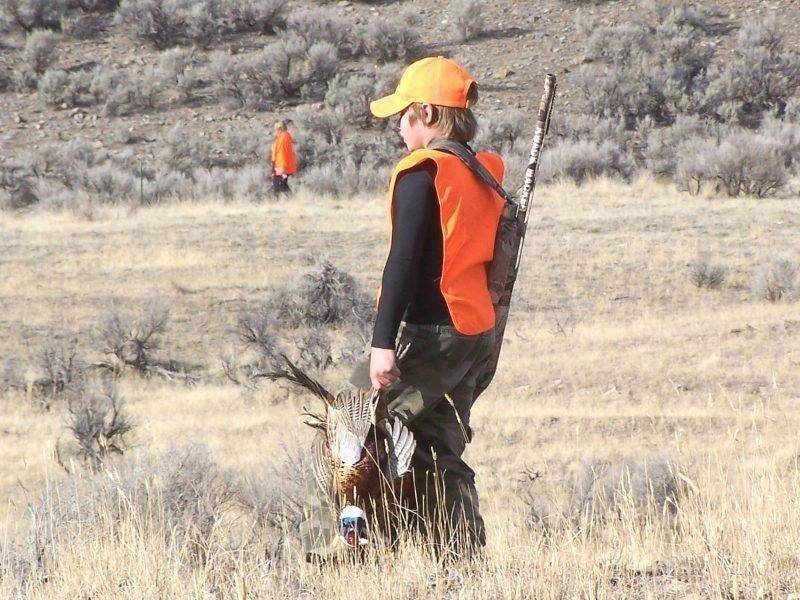DWR Press Release
Pheasants will be released before Oct. 14 – 16 hunt
Oct. 14, 15 or 16 might be the best time this fall to take a young person pheasant or quail hunting in Utah. The state will host its annual youth pheasant and quail hunt on those days. Those who were 17 years of age or younger on July 31, 2017 will have Utah’s pheasants and quail all to themselves.
Pheasant releases
To increase the chance young hunters take a bird, Division of Wildlife Resources biologists will release more than 1,000 rooster pheasants before the hunt. All of the birds will be released on state wildlife management areas and Walk-In Access areas. Visit www.wildlife.utah.gov/uplandgame, before Oct. 14, to learn which areas will receive birds.
Special guided hunts in southern Utah
The DWR has partnered with conservation groups to offer young hunters some special guided pheasant hunts in southern Utah. The hunts will be held in October and November.
Please visit www.wildlife.utah.gov/youth-upland-game-hunts to learn more about the hunts and how to sign up to participate.
Requirements to participate
If you were 17 years of age or younger on July 31, and you’ve graduated from Utah’s Hunter Education program, you can participate in the hunt. You must also have a hunting license and follow all of the state’s upland game hunting rules.
You can find the rules in the 2017 – 2018 Utah Upland Game and Turkey Guidebook. The free guidebook is available at www.wildlife.utah.gov/guidebooks.
If you haven’t completed a Hunter Education course, you still might be able to participate through Utah’s new Trial Hunting program. Visit www.wildlife.utah.gov/trial to learn more.
After Oct. 16, the pheasant and quail hunt will close. The hunt will reopen—for hunters of all ages—on Nov. 4.
Finding a place to hunt
With the exception of Gambel’s quail in the Mohave Desert in southwestern Utah, most of Utah’s pheasant and quail hunting happens on private land. That doesn’t mean you should stay home, though—plenty of places are available to hunt:
Walk-In Access
Jason Robinson, upland game coordinator for the DWR, says the state’s Walk-In Access areas are great places to consider. Walk-In Access areas are private property that’s open to public hunters and anglers through agreements the landowners have made with the DWR.
Robinson says many of the Walk-In Access (WIA) properties have pheasants and quail on them. “If you’re looking for a place to hunt,” he says, “the Walk-In Access areas are the first places I’d try.”
More information about the WIA areas, including which ones have pheasants and quail, is available at www.wildlife.utah.gov/walkinaccess.
WMAs
The DWR manages several wildlife management areas and waterfowl management areas, also called WMAs, across Utah. All of these areas are open to the public. And many have pheasants on them.
More information about the WMAs is available in the “Access to Wildlife Lands in Utah” book. To get the free book, visit www.publications.utah.gov. Once you arrive at the website, type “Access to Wildlife Lands in Utah” into the search bar. Then, hit return.
Private land
In addition to the WMAs and WIA areas, another option is getting written permission from a private landowner to hunt on his or her property. A permission card you can print off and take to the landowner is available at www.wildlife.utah.gov/law/permissioncard.html.
Robinson encourages you to be polite and understanding if a landowner doesn’t give you access. “If you get access,” he says, “make sure you respect the landowner’s property by leaving it better than you found it.”
Robinson says you should not wait until the morning of the hunt to try to get permission. “Get written permission as soon as you can,” he says.
Finding pheasants and quail
Robinson says farm land in Box Elder, Cache, Weber, Davis, Utah, Juab, Millard, Duchesne and Uintah counties are among the best places in Utah to find pheasants. Many of the wetlands near Utah Lake and Great Salt Lake also hold good numbers of birds.
California quail aren’t as widespread as pheasants, but good numbers are found in parts of Duchesne, Uintah and Juab counties.
(Parts of Davis, Salt Lake and Utah counties also hold good numbers of California quail. But most of these birds are within city limits where hunting is not allowed.)
Gambel’s quail are much easier to access—they’re found almost entirely on public land in the Mohave Desert in the central and western parts of Washington County.
More information
If you have questions about the youth pheasant and quail hunt, call the nearest Division of Wildlife Resources office or the DWR’s Salt Lake City office at 801-538-4700.

